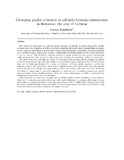Please use this identifier to cite or link to this item:
http://hdl.handle.net/10311/430Full metadata record
| DC Field | Value | Language |
|---|---|---|
| dc.contributor.author | Kalabamu, F. | - |
| dc.date.accessioned | 2010-02-08T12:32:51Z | - |
| dc.date.available | 2010-02-08T12:32:51Z | - |
| dc.date.issued | 2005 | - |
| dc.identifier.citation | Kalabamu, F. (2005) Changing gender contracts in self-help housing construction in Botswana: the case of Lobatse, Habitat International, Vol.29, pp. 245-268. | en_US |
| dc.identifier.issn | 0197 3975 | - |
| dc.identifier.uri | http://hdl.handle.net/10311/430 | - |
| dc.description.abstract | The purpose of this essay is to identify gender contracts in self-help housing construction. Gender contracts have been defined as invisible power relationships that determine roles, responsibilities, privileges, status, sexuality and behaviour of men and women within households, communities, the market and the state. Gender contracts shape social, economic, political and sexual relationships in what people often refer to as ‘our culture’. Various gender contracts constitute a gender system (e.g. patriarchy or matriarchy) under which general rules, perceptions, hierarchies and privileges are formulated, refined and preserved. The paper notes that although the advent of colonialism and capitalism did not replace patriarchal structures in Botswana, they set in new political and production systems that upset the traditional power base and provided opportunities for women to challenge traditional gender contracts—notably the marriage contract that had hitherto been used to oppress women. The paper further notes that despite women having made inroads into male domains, there has surfaced new sites and forms of female subordination largely due to gendered inequalities in accessing and controlling contemporary critical resources (land, money, modern technical skills and formal employment) as well as continued male dominance of community and state structures. Taking Lobatse as a case study, the paper tries to identify gender contracts formed as a result of men’s takeover of construction activities which were traditionally undertaken by women in Botswana. It notes that besides dominating construction work, men control access to land, building skills, housing finance, and the entire self-help housing process in Lobatse, thereby forcing women into subordinate positions from which they have to bargain or negotiate new gender contracts. | en_US |
| dc.language.iso | en | en_US |
| dc.publisher | Elsevier http://www. doi:10.1016/j.habitatint.2003.09.005 | en_US |
| dc.subject | Gender relations | en_US |
| dc.subject | Gender contracts | en_US |
| dc.subject | Self-help housing | en_US |
| dc.subject | Botswana | en_US |
| dc.title | Changing gender contracts in self-help housing construction in Botswana: the case of Lobatse | en_US |
| dc.type | Published Article | en_US |
| Appears in Collections: | Research articles (Dept of Civil Engineering) | |
Files in This Item:
| File | Description | Size | Format | |
|---|---|---|---|---|
| Kalabamu_HI_2005.pdf | Main article | 2.27 MB | Adobe PDF |  View/Open |
Items in DSpace are protected by copyright, with all rights reserved, unless otherwise indicated.
